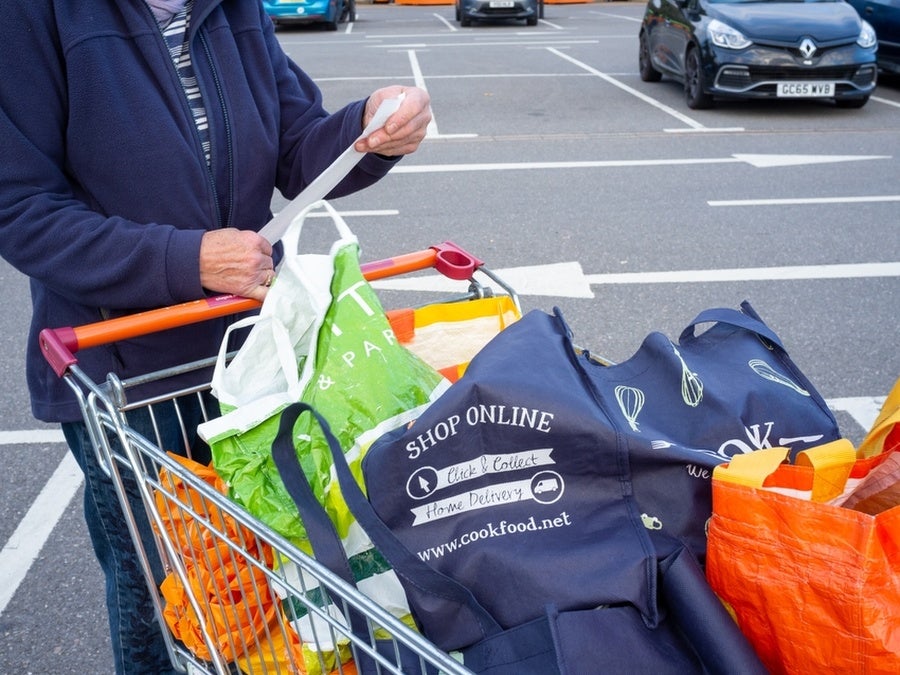
The UK’s competition regulator has concluded supermarkets are not unduly profiteering from pushing up grocery prices but has called for reform on how retailers price their goods.
After a two-month review in the context of “historically high levels” of UK food inflation, the Competition and Markets Authority (CMA) said: “Evidence to date indicates high food-price inflation has not been driven by weak retail competition, but competitive pressure is important as input prices fall.

Discover B2B Marketing That Performs
Combine business intelligence and editorial excellence to reach engaged professionals across 36 leading media platforms.
“Rules on unit pricing should be tightened and retailers must comply to help shoppers compare prices easily.”
The CMA reviewed the major UK grocery retailers Asda, Morrisons, Sainsbury’s and Tesco, as well as discounters Aldi and Lidl.
It found operating profits in the sector fell 41.5% in 2022-23, while average operating profit margins dropped from 3.2% to 1.8%, effectively ruling out the growing claims of profiteering, or variations on the theme such as greedflation and price-gouging.
“This is due to retailers’ costs increasing faster than their revenues, indicating that rising costs have not been passed on in full to consumers,” the CMA concluded in its statement today (20 July).

US Tariffs are shifting - will you react or anticipate?
Don’t let policy changes catch you off guard. Stay proactive with real-time data and expert analysis.
By GlobalData“Consumers are shopping around to get the best deals, and the lowest-price retailers – Aldi and Lidl – have gained share from their competitors. This suggests retailers are restricted in their ability to raise prices without losing business.”
The CMA said that outside of looking at competition within the main retailer groups, “it has not yet examined competition for individual product categories or across the wider grocery supply chain”. That will form the next stage of the regulator’s review.
Unit pricing concern
However, it has identified “compliance concerns” when it comes to unit pricing after reviewing 11 supermarkets, along with seven other retailers selling a combination of homeware and household goods and limited groceries.
Those concerns revolve around the so-called price marking order (PMO), a regulation requiring the selling price and unit price to be clearly displayed.
“For some retailers, these were relatively minor,” the CMA noted, adding that “compliance is worse amongst some variety retailers”.
Consistency was one of the CMA’s criticisms, as it called on the government to reform unit pricing legislation “to help shoppers spot the best deals”.
“The CMA has also written to those that are not fully complying with the PMO and expects them to make changes to address its concerns or risk enforcement action,” the regulator added.
“More broadly, the CMA is calling on all retailers to give consumers the unit pricing information they need to make meaningful comparisons, particularly for products on promotion, even before any reforms to the PMO are introduced.”
An example of the inconsistencies cited was tea bags being priced per 100 grams for some products and others being unit priced per tea bag.
Legibility was another, or “unit pricing information being difficult to read, for example, text on labels being too small or shelf edge labels being obscured by promotional information or by shop fittings”.
And for promotions, with “some retailers not displaying unit prices for any products on promotion”.
Sarah Cardell, CEO of the CMA, said: “We’re writing to these retailers and warning them to make the necessary changes or risk facing enforcement action. The law itself needs to be tightened here, so we are also calling on the government to bring in reforms.”
Cardell also made reference to prices charged by UK grocery retailers for fuel, an area that has received widespread criticism amid the country’s steep levels of inflation, especially in food and energy costs.
She added: “We’ve also looked at how competition is working across the grocery retail market more widely. The overall evidence suggests a better picture than in the fuel market, with stronger price competition between all of the supermarkets and discounters.
“In the next phase of our work, we will examine competition and prices across the supply chain for the product categories we’ve identified.”
The CMA said it will publish its conclusions on unit pricing in the autumn.
Yesterday, the UK’s Office for National Statistics (ONS) reported food inflation had cooled in June but consumers were still facing double-digit price increases year on year.
Prices also eased in the overall economy, with headline inflation – measured by the consumer price index – rising 7.9% in the 12 months through June, compared to 8.7% in May, the Office for National Statistics (ONS) reported today (19 July). On a monthly comparison, prices climbed 0.1%, down from 0.8% in June last year.
The annualised inflation rate for food and non-alcoholic beverages continued a retreat from the 19.2% peak reached in March, which was the fastest rate in 45 years, according to the separate CPIH index. However, last month’s print of 17.4% – down from 18.4% in May – was only the smallest increase since January’s 16.8% pace.



